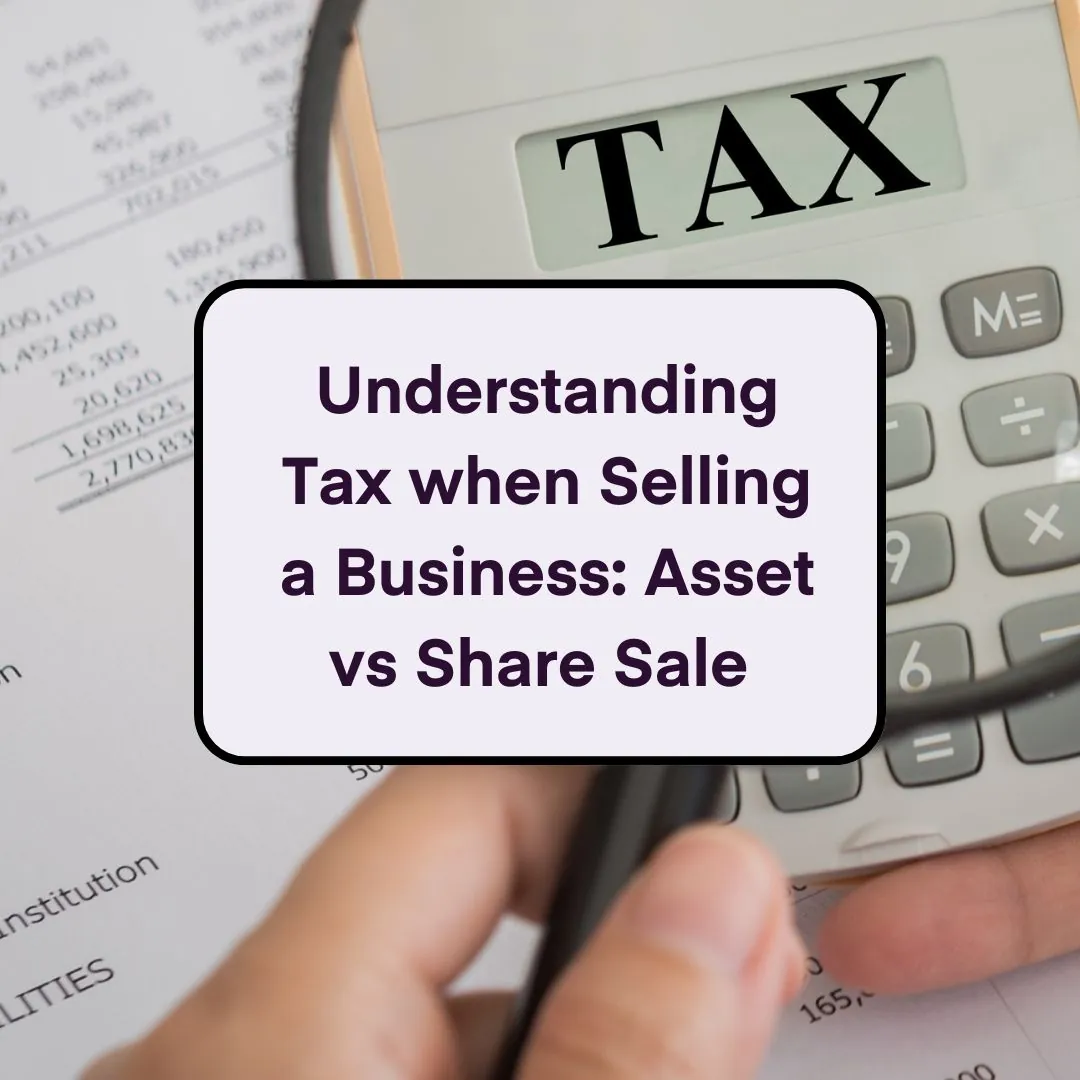Preparing to buy a business
If you’re hoping to buy a business, there are a few things to consider. Firstly, do you know what business you want to buy yet? Or are you on the hunt? Why are you looking to buy a business? Is it to extend your reach in a sector? Are you part of a management buyout or merger? Are you adding another business to your portfolio? Your answers to these questions are important, as they’ll dictate how the deal is structured, whether it’s an asset or a share sale, and how much tax you’ll eventually pay. Our legal advisors can help you answer these questions if you don’t have an answer yet, and better yet, we’ll help you structure the deal in a way that suits your goals and saves you from paying unnecessary tax.

Business Valuations: Getting the Right Price
Getting the best price comes down to having realistic expectations and an ability for both sides to compromise. The seller will set a price, often based on market conditions, revenue, profits, and we’ll undertake thorough due diligence to identify whether we think this price is fair. Due diligence will uncover any liabilities, issues relating to either the financial or legal foundations of the business, all of which will factor into the cost. The process of due diligence is forensic and is designed to dig deep into every aspect. Ultimately, deciding the right price is a process of negotiation, and we’ll be by your side to ensure you get a fair and realistic price after thorough due diligence and a realistic business valuation.

Due Diligence: The Key to a Confident Business Purchase
The due diligence process is designed to uncover any potential issues that may affect the value of the business, or in some cases whether the deal happens at all. Our lawyers will take a deep dive into the business you’re hoping to purchase, by exploring;
- Contracts
- Share structures and ownership
- Employment matters and HR
- Ongoing litigation or disputes
- Property
- Intellectual Property, Trademarks, Copyrights
- Financial Statements
- Cash Flow & Working Capital
- Debts and liabilities
- Revenue and customers
- Cost structure and profit margins
- Tax and Compliance
- Assets and Investments
- Forecasts and potential growth plans
After our forensic look into the elements above, you’ll have knowledge of everything that could potentially become an issue, and whether the company is both financially stable and legally compliant.

What is included in the sale of a business?
Will I inherit the office dog? What about the Leather Sofa monstrosity in reception? All valid questions.
To put it in its simplest form, when you buy or sell a business, you inherit anything that’s essential to running the business. That includes working capital, furniture and fixtures (unfortunately for some), equipment, property, contracts, vehicles and goodwill. What do we mean by goodwill? It refers to the customer base, the business’ reputation and relationship with suppliers and partners. The elements that are excluded are any personal investments or assets, long-term liabilities like mortgages or loans, taxes or anything owed by shareholders. Each business sale is unique, and the contracts drawn up are personalised to include or exclude anything agreed by both parties.
How do I know how much my company is worth?
There are plenty of websites out there that reduce valuing a business down to a few easy sums. But the truth is, it's not that simple.
There’s much more involved to give you the all-important number. The main element that sets you on the right path is using someone who understands your business, inside and out. A more useful question is what affects the value of the business? Turnover, profit, debt levels, customer base, and demand all play an important role in the value of a business. But there’s also plenty of external factors that are less concrete such as market conditions and the state of the industry you’re in. In essence, valuing a business takes lots of consideration and there are tonnes of variables that influence it. A lot of businesses will need a valuation at some point – whether it’s to seek investment, to prepare for sale or to even work out how a business will be split if one of the owners decides to part ways. With our legal and corporate finance team, we’re able to assess your business, take a look behind the curtain and dig into the numbers so we can give you a realistic value for your business.
How long does it take to buy or sell a business?
But it’s a valid question that business owners will want to know before they embark on the path of selling or buying a business. In terms of the actual deal itself, it can take anywhere between 6 and 9 months. The length of time it takes varies depending on several factors. The size and complexity of the business, market conditions, the level of interest from potential buyers, and the readiness of both the seller. With the right preparation, an eye for the details and well-structured business plan, business owners can increase the chance of a timely sale. Ultimately though, the time it take is unique to each individual case. Check out our full guide to buying a business for more information.
Meet Our Legal Director Rachel
Rachel singlehandedly launched the legal part of our offering back in 2019, and since then has worked with businesses of all shapes and sizes.
With over 20 years of experience, Rachel is a specialist in all the things your business will need: from business sales and purchases, due diligence, company restructuring, commercial contracts and commercial leases (the list just keeps going). Rachel managed the full legal process involved in Aspire’s Acquisition of Method4, and she’s helped countless more entrepreneurs with buying businesses.

Our Head of Corporate Finance, Neil Nichols
Neil Nichols, Founder of Accounts and Legal set up the business after successfully growing and selling his previous company, Portico, which he ran alongside his brother Robert Nichols. During the process of selling, Neil was taken aback by the unnecessary friction between accounting and legal functions, and this is where the seeds were sewn for Accounts and Legal. After surveying other business owners, Neil found that the majority stated their accountants weren’t wholy useful past the necessary compliance work. Armed with this information, Neil set up Accounts and Legal to be genuinely useful to business owners, providing the services they need in one place.

Meet Neil Ormesher: Tax Planning Expert for Business Sales & Acquisitions
As CEO of Accounts and Legal, Neil Ormesher brings over 25 years of experience in accounting, tax planning, and business strategy. A fully qualified accountant, Neil has helped countless business owners navigate acquisitions while maximising tax efficiency. In his previous role, Neil was key in growing the Danbro Business Brand from zero to 1,500 clients, building a high-performing team and a service offering dedicated to helping entrepreneurs. Most recently, Neil was instrumental in structuring the Westland Asset acquisition of Direct Sameday Services (DSS) read the acquisition case study here.



















